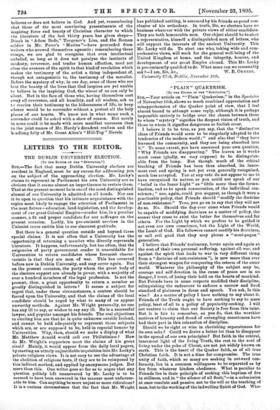LETTERS TO THE EDITOR.
THE DUBLIN UNIVERSITY ELECTION.
ITO TX! EDITOR OF TB! SPECTATOR:]
StR,—The fact that many Dublin University electors are resident in England, must be my excuse for addressing you on the subject of the approaching election. Mr. Lecky's claims to represent in Parliament his own University are so obvious that it seems almost an impertinence to restate them. That at the present moment he is one of the most distinguished alumni of our University is admitted on all hands. Nor can it be open to question that his intimate acquaintance with the topics most likely to engage the attention of Parliament in the near future—education, land-legislation, and the develop- ment of our great Colonial Empire—render him, in a peculiar manner, a fit and proper candidate for our suffrages on the present occasion. Lastly, his pre-eminent services in the Unionist cause entitle him to our sincerest gratitude.
But there is a general question outside and beyond these special claims. It is not often that a University has the opportunity of returning a member who directly represents literature. It happens, unfortunately, but too often, that the exigencies of party government render it unavoidable for Universities to return candidates whose foremost charac- teristic is that they are men of war. This has occurred before now in Dublin University, and may occur again. But on the present occasion, the party whom the great body of the electors support are already in power, with a majority of over a hundred members of the legal profession. Is not the present, then, a great opportunity to return a member so greatly distinguished in letters ? It seems a subject for regret that, under these circumstances, a contest should be forced upon the University, and that the claims of the local candidate should be urged by what to many of us appear unworthy methods. Against Mr. Wright personally, no one has any ill to say, or wishes to say any ill. He is a successful lawyer, and popular amongst his friends. The real objections to electing him are that he is quite unknown outside Ireland, and cannot be held adequately to represent those subjects which are, or are supposed to be, held in especial honour by Universities. Wby, then, should we make a display of what Mr. Matthew Arnold would call our Philistinism ? How do Mr. Wright's supporters meet the claims of his great rival? Mainly, it would appear from the daily local papers, by starting an utterly unjustifiable inquisition into Mr. Lecky's private religious views. It is not easy to see the advantage of the abolition of religious tests, if they are to be reimposed by this indirect method, and applied by anonymous judges. But more than this. One writer goes so far as to argue that any question politely left unanswered by Mr. Lecky is to be (teemed to have been answered in the manner most unfavour- able to him. Can anything be more unjust or more ridiculous ? It is a curious circumstance that the fact that Mr. Wright has published nothing, is assumed by his friends as proof con- clusive of his orthodoxy. In truth, Sir, we electors have no business whatever with the private views of either candidate. They are both honourable men. Our object should be to elect a representative, himself a distinguished man of letters, who will support the interests of the ancient Univetsity. This Mr. Lecky will do. To elect one who, taking wide and com- prehensive views, will work for the general well-being of the United Kingdom at home, and the integrity, honour, and development of our great Empire abroad. This Mr. Lecky is pre-eminently qualified to do. What more can we reasonably ask ?—I am, Sir, Sze., W. E. ORMSBY. University Club, Dublin, November 19th.










































 Previous page
Previous page